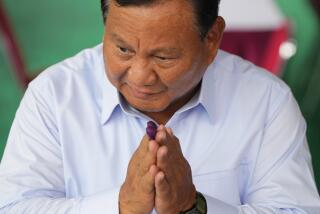Indonesia’s Army Crisis
- Share via
Indonesia’s new president, Abdurrahman Wahid, has displayed dexterity that few expected of the frail Muslim cleric in handling the country’s multiple problems. He will need that and more in tackling Indonesia’s biggest challenge, suppressing the independence of the military. He should start by forcing out Gen. Wiranto, the former chief of armed forces, and putting him on trial with his top lieutenants for their roles in last year’s massacre in East Timor.
Wahid has been gradually dismantling the army’s formidable political base but was not as decisive as Indonesians had hoped. He should not delay further in bringing the brass to book following this week’s finding by a specially appointed human rights commission that the military was clearly implicated in last year’s atrocities in East Timor. The commission held Wiranto and a number of senior officers responsible for condoning the violence that followed the island province’s vote for independence.
Wahid has a tough job. He must keep the governing coalition together, quell secessionist violence in Aceh, the northernmost province of Sumatra, and subdue sectarian bloodletting in the Spice Islands. At the same time, his goal must be to deliver democracy and prosperity to a nation oppressed for more than three decades by the ousted President Suharto.
So far, he has reshuffled the military command, though he did not remove Wiranto from the Cabinet. He paid a long-delayed visit to Aceh but did not speak with local community leaders about the future of the restive province. His Cabinet agreed to a program of bank and corporate restructuring, clearing the way for an International Monetary Fund loan, but his first budget lacked specific measures to propel growth. And he has made little progress in his promise to bring to justice the corrupt officials of Suharto’s regime.
While on a long trip abroad, Wahid first ordered and then asked Wiranto to resign his post as minister for political affairs and security. Predictably, the general refused to step down and denied any responsibility for human rights violations in East Timor. Now the time has come for Wahid to fire the general and personally deal with any potential government crisis.
Putting the top military men on trial as speedily as possible would help Wahid’s government to break with the past and fortify his democratic credentials at home and abroad.
More to Read
Sign up for Essential California
The most important California stories and recommendations in your inbox every morning.
You may occasionally receive promotional content from the Los Angeles Times.













